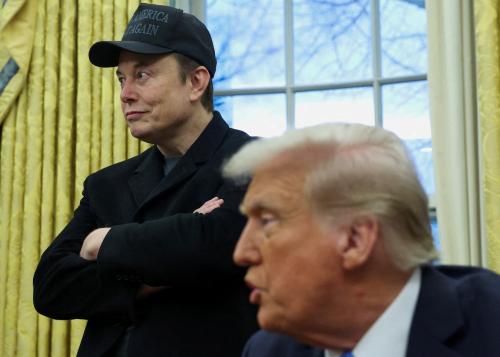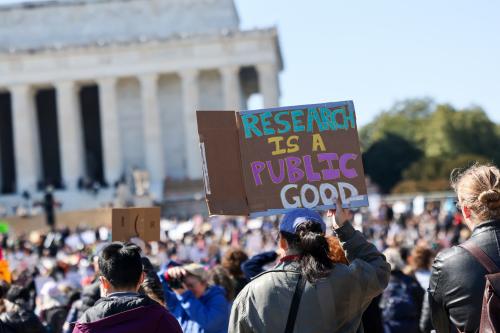President Trump’s Department of Government Efficiency has cut through the federal government aggressively, firing employees across agencies while testing legal boundaries. The speed of the cuts raises questions about how well DOGE teams understand the roles and responsibilities of those affected. Unsurprisingly, as key political appointees are confirmed by the Senate and take office—and as Republican lawmakers gain points of contact—some early, hasty decisions are being reversed. Here are some examples so far.
- The most significant reversal came on Feb. 24, when the White House, through the Office of Personnel Management, announced that Elon Musk’s directive for all federal employees to email him a summary of their work for the week was voluntary only and that noncompliance would not result in termination. Some MAGA leaders, including newly appointed FBI Director Kash Patel, instructed their employees not to comply. Similar orders came from the Departments of Defense, Homeland Security, Justice, Health and Human Services, Energy, and the State Department.
- The reversal came not only due to legal concerns but also because the order was impractical for large parts of the government. For instance, the Secret Service agents protecting President Trump probably carried out numerous tasks in preparation for his upcoming trips—should that be reported? What about undercover agents abroad? Should they document efforts to recruit assets or spies? And FBI agents working to infiltrate the infamous Sinaloa drug cartel—should they be required to write memos that could compromise their operations?
- Earlier DOGE reversals include the dismissal of more than 300 employees from the National Nuclear Safety Administration on Feb. 13. By Feb. 18, however, the vast majority of them were in the process of being rehired. The agency, part of the Department of Energy, oversees the safety and security of the U.S. nuclear arsenal.
- On Feb. 18, the Trump administration temporarily paused layoffs of nearly 1,000 probationary civil servants at various NASA facilities. These layoffs were later postponed. This follows at least 750 NASA employees who voluntarily accepted the deferred resignation offered by the federal government. Many affected employees are in their probationary period—young scientists and engineers who could play a role in NASA’s efforts to reach Mars, a key goal of President Trump.
- At the Department of Agriculture, 58 facilities responsible for responding to the bird flu were notified that 25% of their staff were being laid off, but they were quickly rehired. With the price of eggs already high, delaying bird flu research could keep costs elevated and undermine one of the key issues that helped elect Trump.
- Health and Human Services Secretary Robert F. Kennedy Jr. verbally rescinded the layoffs of about 950 Indian Health Service (IHS) employees just hours after they received layoff notices. OPM had originally planned to lay off 2,200 probationary employees at IHS, a move that would have significantly affected the 214 tribal nations relying on IHS for health care.
- Defense Secretary Pete Hegseth halted the planned firing of 55,000 Pentagon officials in order to comply with a law requiring the defense secretary to review any firings for their impact on military “lethality and readiness.” He is now reviewing the cuts and determining which employees the Pentagon will fire.
- Russell Vought, the new director of the Office of Management and Budget, quietly reinstated the workers responsible for calculating the APOR (Average Prime Offer Rate) each week. This data is critical for maintaining stability in the mortgage market. Without APOR tables, home values could be distorted, and borrowers could face restricted credit access. The APOR was housed in the Consumer Financial Protection Bureau, a frequent target of conservative criticism. A stop-work order had been in place until Vought, a staunch Trump ally, recognized the necessity of publishing the APOR.
Why are these reversals coming now?
Trump’s political appointees are gradually taking office, while Republican members of Congress—many of whom are experienced in government—are recognizing the risks the DOGE approach poses to both the nation and their own careers. Over the past month, DOGE teams operated unchecked in federal agencies due to a lack of leadership.
It took “multiple members of Congress” petitioning newly installed Energy Secretary Chris Wright and highlighting the national security risks of firing personnel responsible for overseeing the U.S. nuclear arsenal before the decision to fire them was reversed. Similarly, Republican lawmakers on the House Agriculture Committee and researchers criticized USDA-related layoffs for potentially weakening the bird flu response. The reversal came just days after Agriculture Secretary Brooke Rollins assumed office. Meanwhile, several senators have introduced a bill to reinstate the Food for Peace Program—formerly housed at USAID—and transfer it to the Agriculture Department.
DOGE has an enormous opportunity to improve the federal government—especially in the area of information technology. However, blanket firings and poorly planned demands for employees to justify their work week are undermining its credibility and authority. As court cases continue, expect more quiet reversals. No one wants to be blamed for rising egg prices or the next terrorist attack.
The Brookings Institution is committed to quality, independence, and impact.
We are supported by a diverse array of funders. In line with our values and policies, each Brookings publication represents the sole views of its author(s).







Commentary
The fallout from DOGE’s approach to government reform
February 26, 2025